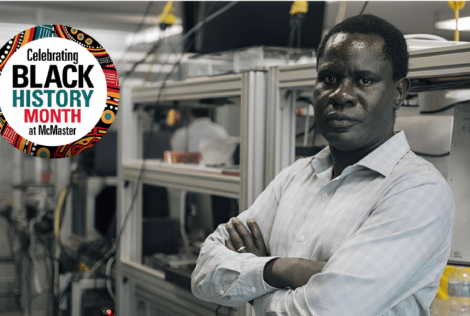
In his Q&A spotlight in celebration of Black History Month Akintayo talks about the significance of this month, his research goal to improve steel quality for Canadian steel makers, his views on McMaster Engineering’s new equity, diversity and inclusion initiatives and much more.
Akintayo will be taking over the @mcmastereng Instagram account today to share his research experience and a day in the life as a McMaster Engineering PhD student. Make sure to tune in!
Q: What does Black History Month mean to you?
A: For me, Black History Month is an opportunity to reflect on the contemporary challenges faced by people of colour in our society.
It’s also a chance to the reiterate the contributions and the milestone achievements by Blacks to the scientific, educational, economic, and social architecture of our communities, countries, and the world at large.
It’s a time be more inclusive, ensuring everyone’s input isn’t excluded from our history books irrespective of their skin colour.
Q: Can you describe the research you are working on?
A: I’m currently working on an NSERC Alliance research project in close collaboration with research engineers from US Steel, Tata Steel and Stelco.
My research aims to study the effects of alloying elements on the solidification mechanisms in Advanced High Strength Steels (AHSS). These modern generation steels find application as automotive parts.
The goal of my research is to assist Canadian steelmakers in improving their steel casting quality, increasing production output and cost benefits, as well as minimizing defective steel products during downstream processing.
Q: Can you tell us why you chose McMaster Engineering and what you like most about your experience?
A: I chose McMaster Engineering for my doctoral research for many reasons. I love my research project, the collaborative approach of my advisor and the chance to do all of this within a highly-ranked Materials Engineering program (in Canada and worldwide).
I plan to use some electron microscopy tools during my research and I have the chance to use some of the most sophisticated microscopy facilities at the Canadian Centre for Electron Microscopy (CCEM) located at McMaster.
The unique co-op option at the graduate level was another incentive to join Mac Eng as I get the chance to gain valuable Canadian work experience and establish a network of professional contacts in the industry before graduation.
Although I just joined the program last month, I’ve received great support from the administrative staff and the career planning sessions organized by Engineering Co-op and Career Services.
I’ve also had the chance to attend departmental industry nights where I spoke directly with company representatives in Canada concerning what is obtainable in the industry and the opportunities therein.
Q: Who is your role model?
A: That would be my elder sister who’s currently a doctoral candidate in the US.
An adage from my home country says, “A horse follows the example of the preceding one during a race.” Hence, she’s been my role model to date by paving that path of excellence that I have followed.
Q: What do you think about some of the new EDI initiatives coming out of McMaster Engineering including the new IBET Fellowship and the NSBE Scholarship?
A: I believe both are great initiatives in attracting black talents to McMaster and increasing the state of diversity in the engineering programs, the university community, and the future workforce in academia/industry.
I’ve been a scholarship beneficiary in the past, and I know that how it feels when one’s financial stress is eased. Although the IBET fellowship is currently open to Canadian citizens and permanent residents who identify as black, I hope that it would be extended to black international talents in subsequent years.
Nevertheless, I commend the brains behind the IBET Fellowship and the leadership of NSBE for their strong dedication towards equity, diversity, and inclusion at McMaster Engineering.


